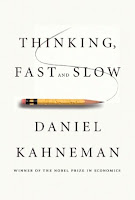That leads us to You're Not Doing It Right, which is probably described everywhere as a "cutting" and "honest" look at self-image, relationships, marriage, and parenting. These terms are apt because Black says things that most of us think but don't typically pronounce publicly, like that we sometimes hate our spouse or our children (I don't have children, but I imagine there will be times when I can't stand them). Unlike Bossypants, Black's book is entirely about his personal life (there's nothing specific about any of his writing or acting), so there is a lot of introspection about his own failings and shortcomings as an individual.
Not surprisingly, the book is quite funny, both because Black is so caustic and because he has no shame in exposing the worst parts of himself. In fact, I felt better about myself reading it (hey, my husband and I have our problems, but we don't fight like that). But what I really enjoyed was that he's able to own up to the sucky parts of life without sugar coating it, and I think sometimes we're so programmed to try to be positive that we're hurt by not acknowledging that the best things in life (a spouse, children) can sometimes be awful.
There were a few sections I bookmarked. This one I share because I am exactly the same way (though my husband's generally thrifty), and I had no idea anyone else felt like this:
"Money is a constant flash point between [Black and his wife] since we have very different attitudes about its purpose. Martha is of the opinion that money is to be spent in order to create a better life for herself and her loved ones, whereas I am of the opinion that money is a means of keeping score. The more you have, the more you are winning. Winning what? Just winning. Isn't that enough?" (155).I also liked how he talked about "shrouding his best self" in a marriage. We so often give our "best" self to our coworkers and our friends and save the grumpy, no-fun self for our spouse. Perhaps part of the "hard work" of marriage is taking the energy to bring that self forward more often.
You're Not Doing It Right is not an advice book, but Black does show that it's okay to sometimes have selfish thoughts and be a jerk, so long as you recognize it once in a while.








